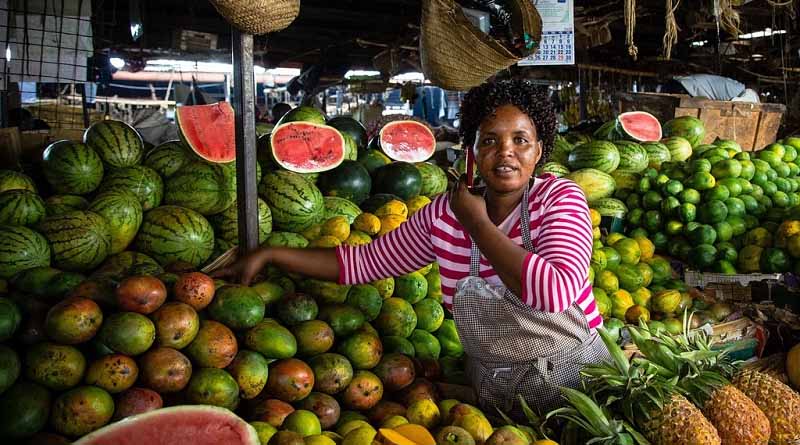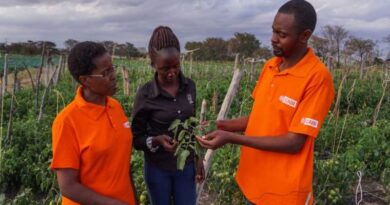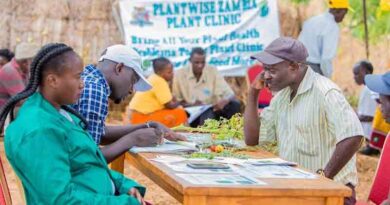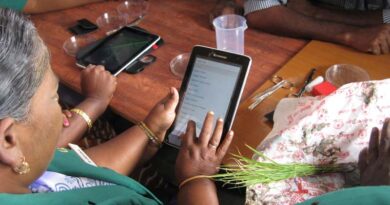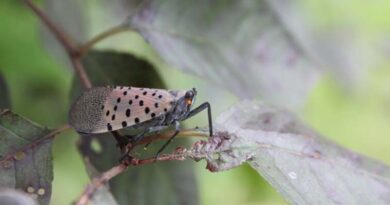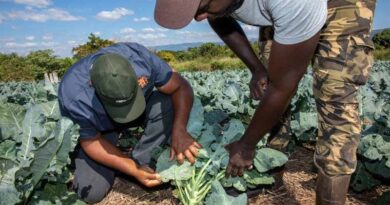Empowering smallholder farmers in Kenya to produce sustainable safe food
12 October 2023, Kenya: Smallholder farmers play a vital role in feeding communities around the world. In Kenya, the CABI-led PlantwisePlus programme is making significant strides to enable these farmers to grow safe and high-quality foods through sustainable crop production.
This initiative aims to increase the supply of, demand for, and trade in safe, high-quality, locally produced food – including fruits, vegetables, herbs, and spices, within domestic markets – by mitigating crop pests and diseases which threaten yields.
To achieve this goal, CABI is collaborating with a range of private and public entities, including the Micro Enterprises Support Programme Trust (MESPT) and FarmWorks Ltd, to help farmers adopt Good Agricultural Practices (GAPs).
In this blog, we explore the efforts of these organizations to empower Kenyan smallholder farmers and promote food safety including meeting the requirements of KS1758-Horticultural Code of Practice. The Standard was developed in line with domestic and international protocols on food safety, workers health and safety, environmental sustainability, and crop protection.
This code intended to enhance farm assurance systems, compliance to relevant laws of Kenya and strict adherence to the safe use of chemicals.
Empowering smallholder farmers through collaboration
MESPT is a critical partner in CABI’s mission to enhance sustainable crop production and promote food safety among smallholder farmers in Kenya.
MESPT is a development organization with a clear purpose: to boost the productivity, income, and competitiveness of smallholder farmers and Agri-SMEs, with a particular focus on youth and women.
They achieve this through various capacity-building initiatives, including skills development, technical support, business advisory services, and facilitating financial and market linkages.
One of MESPT’s remarkable projects is the banana project in Taveta sub-County, which targets 2,000 banana farmers. To reach these farmers effectively, MESPT utilizes the Business Service Providers (BSPs) model.
BSPs are selected from among farmers and serve as service providers to their peers. Their duties encompass training farmers in various agronomic practices and emerging technologies, as well as offering support in extension work.
However, challenges have emerged in the form of pest-related issues affecting banana crops, which prompted further action.
CABI has also partnered with Farmworks Ltd company. This is a private agricultural company based in Kenya whose aim is to unlock Africa’s agricultural potential by building
clusters of mid-sized farms while working with thousands of small-holder farmers and establishing direct linkage to local and global markets.
Over 2,000 smallholder farmers participate in FarmWorks’ out-grower programme, which has enabled it to establish a supply chain network that guarantees the prompt delivery of high-quality produce.
Identifying pest challenges and ensuring food safety
A SWOT analysis conducted with the BSPs and MESPT management in Taita Taveta county and Farmworks Ltd management revealed significant pest challenges impacting crop production, hence hindering optimal production.
These challenges include nematodes, moles, thrips, banana weevils, cigar end rot, Panama disease, sweet potato weevil among others.
Dr Naphis Bitange, Postdoctoral Fellow-Systems Agronomist at CABI, said, “Farmers have a tendency of using pesticides on their crops even when pest infestations have not reached economically damaging levels. This is against the IPM principles. Such practices not only pose risks to food safety but also lead to reduced profits for these smallholder farmers.”
To address these challenges, CABI has partnered with various stakeholders, including the Fresh Produce Exporters Association of Kenya (FPEAK) and the Kenya standard 1758-Horticultural Code of Practice Standard Implementation Committee.
Together, they have identified a range of pests that require updated pest management guides.
A write shop was organized to develop and update Pest Management Decision Guides (PMDGs) for pests affecting crops in peas, sweet potatoes, bananas, tomatoes, and avocados value chains.
Four agronomists, two from FarmWorks and two from MESPT, attended this write shop alongside representatives from various institutions.
Creating pest management solutions
During the write shop, a total of 52 Pest Management Decision Guides were developed or updated for crops across multiple value chains.
These guides cover a wide range of pests and offer valuable insights into effective pest management strategies. Furthermore, to ensure accessibility for local farmers, the PMDGs were translated into Kiswahili, making them more widely usable.
The scientists leading this endeavour came from esteemed organizations, including the Kenya Agricultural and Livestock Research Organization (KALRO), the Kenya Plant Health Inspectorate Service (KEPHIS), the Pest Control Products Board (PCPB), FPEAK, the Ministry of Agriculture, Livestock, Fisheries, and Co-operatives (MoALFC), the KS 1758 Standard Implementation Committee, and CABI.
Knowledge and resources necessary to thrive
The PlantwisePlus programme is making remarkable strides in empowering smallholder farmers in Kenya to produce safe and high-quality food sustainably.
Through collaborations with partners like MESPT and FarmWorks Ltd, and by addressing critical pest-related challenges, this initiative is not only improving food safety but also increasing the competitiveness and income of farmers.
As CABI continues to work in partnership, the future looks brighter for smallholder farmers in Kenya, as they gain the knowledge and resources necessary to thrive in the agricultural sector while ensuring the safety and quality of the food they produce.
(For Latest Agriculture News & Updates, follow Krishak Jagat on Google News)

